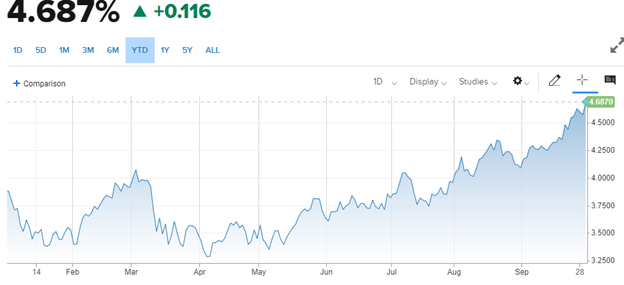Rising Interest Rates
Slowly but surely, longer term interest rates keep grinding higher, seemingly every day. This has surprised market participants and is being reflected by lower bond and stock prices.
While we are certainly closer to the end of rising interest rates than we were a year, or even just a couple of months ago, until investors regain their comfort that we are about done with rising rates, it will probably continue to be a choppy market for both bonds and stocks.
The chart below shows the move in the 10-year Treasury bond this calendar year.

Source: CNBC
Historically, one positive thing to remember is that higher rates will most likely equal higher long- term returns, from both bonds and stocks. But getting there is not a lot of fun.
We balance our clients’ bond portfolios with short term and intermediate term bonds. Why do we do that? Because we do not know when short-term or long-term rates will stop going up and perhaps even go down. If rates keep going up, our short-term bond funds will continually generate higher income as their bonds that are maturing regularly are reinvested into higher returning shorter-term bonds. Owning intermediate term bonds provide a good current yield, but also could provide price appreciation if the market decides that interest rates need to come down to accommodate a slowing economy.
Diversification is an implicit acknowledgement that we don’t know what the future holds. Diversification in bonds and stocks keep us from being 100% wrong. Peter Bernstein, the great author and money manager, said several times that the key to investment success is survival- in other words not betting all your chips on one particular hoped for outcome.
The recession that has been called for by many financial “experts” for the last year or more may eventually get here. If so, how much of that has already been discounted by current lower stock prices is impossible to determine. But one thing we know is that the business cycle has not been outlawed, long-term investors will go through many periods of economic expansion and contraction.
And a big key to investment success is not trying to do the impossible, which is trying to time when to exit and enter the market based on “feelings” and “talking heads” on financial networks.
It can be very frustrating at times (sometimes longer than we like) to be invested in a diversified portfolio. But until we somehow get tomorrow’s news delivered to us today, we have to accept that the future is unknowable and as Warren Buffet says,” The most important quality for an investor is temperament, not intellect.” Patience and discipline are the keys.
Forty years of experience in this profession has humbled me many times over. Admitting that we don’t know the future is why we create portfolios that are as “all-weather” as possible. Minimizing investment costs and taxes, and not taking any unnecessary risk is the best way we know to help you meet your goals.
As always you will hear from us regularly, but in the interim please do not hesitate to call with any thoughts or questions. And thank you for your trust in us.
Beach
Disclosure: Any opinions are those of Beach Foster and not necessarily those of Raymond James. Expressions of opinion are as of this date and are subject to change without notice. The information has been obtained from sources considered to be reliable, but we do not guarantee that the foregoing material is accurate or complete. The information contained here does not purport to be a complete description of the securities, markets, or developments referred to in this material. Any information is not a complete summary or statement of all available data necessary for making an investment decision and does not constitute a recommendation. Past performance may not be indicative of future results. Future investment performance cannot be guaranteed, investment yields will fluctuate with market conditions. Investing involves risk and you may incur a profit or loss regardless of strategy selected, including diversification and asset allocation. Raymond James and its advisors do not offer tax or legal advice. You should discuss any tax or legal matters with the appropriate professional. Bond prices and yields are subject to change based upon market conditions and availability. If bonds are sold prior to maturity, you may receive more or less than your initial investment. Holding bonds to term allows redemption at par value. There is an inverse relationship between interest rate movements and bond prices. Generally, when interest rates rise, bond prices fall and when interest rates fall, bond prices generally rise. There are special risks associated with investing with bonds such as interest rate risk, market risk, call risk, prepayment risk, credit risk, reinvestment risk, and unique tax consequences. To learn more about these risks and the suitability of these bonds for you, please contact our office. If you no longer wish to receive this email, please reply “unsubscribe”.


